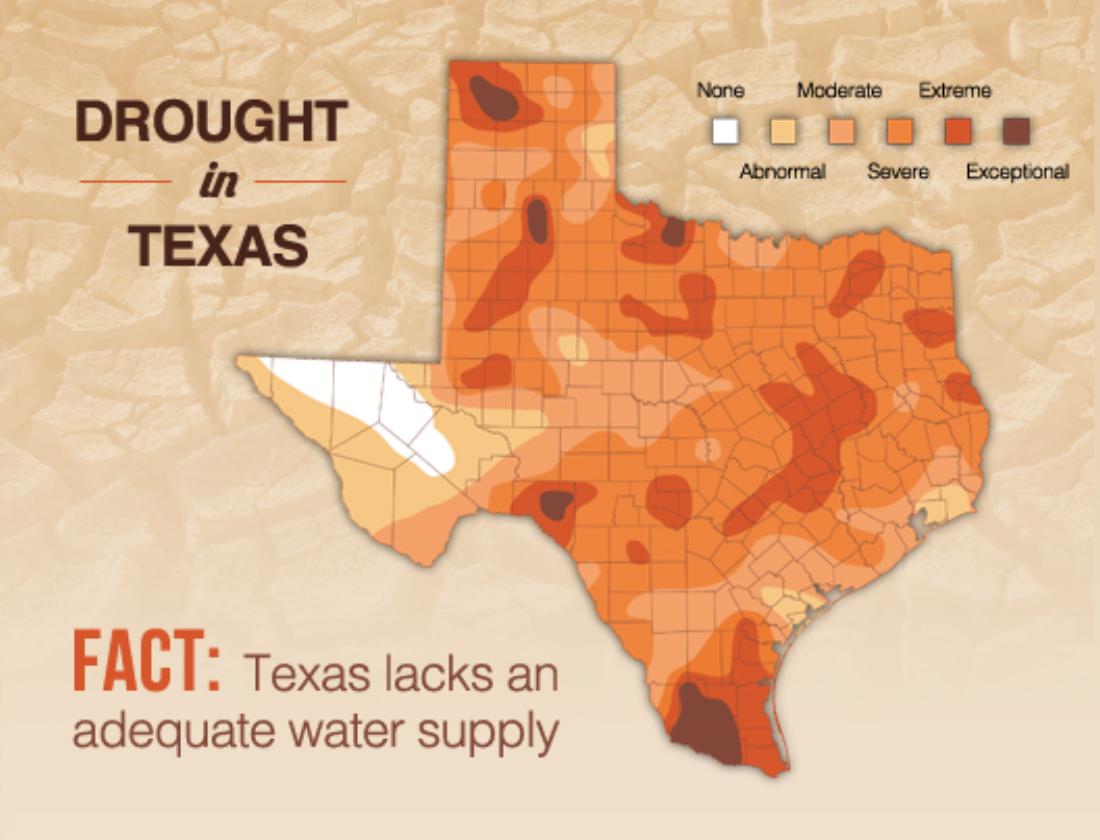For a plan that purports to thoughtfully guide Texas through a crowded, thirsty future, the 2012 State Water Plan reads unsettlingly like a playbook from the last century: dams to divert already limp river flows, big pipes pumping rural water hundreds of miles to thirsty city centers, and dozens of evaporation-prone reservoirs to fill in for those that have already gone dangerously dry.
The slurry of projects that would be kicked into gear by the constitutional amendment known as Proposition 6, to be voted on Nov. 5, offer a needlessly wasteful version of the future.
Prop 6 would create a funding mechanism to rapidly deploy much of the State Water Plan’s $53 billion in strategies, as approved by a recently restructured Texas Water Development Board.
“How the money will be apportioned is still unknown,” Ronald Kaiser, Texas A&M University professor of water policy, told the Houston Chronicle. “People are putting all their faith in the water board.”
The fact that Perry dismissed the leadership of the water board to install his own triumvirate in September, including the owner of a natural gas company from which Perry made $25,000 in 2011, should give voters pause.
But the plan is flawed from its start. It assumes that a projected 82 percent population increase by 2060 will require a 22 percent increase in potable water. In fact, though Texas’ population has more than doubled since 1970, our overall water use has remained nearly static.
The amendment is being pushed by two political action committees largely funded by energy and chemical companies that rely on large volumes of cheap water. Their rhetoric ignores the fact that the TWDB still has $360 million in bonding authority granted by voters in 2001 and $6 billion more granted in 2011, more than enough to cover all of the projects the plan calls for by 2020. Despite the slick marketing, this is not a vital vote to secure your future. It’s a vote to undo the public purse strings too early on a clearly flawed plan.
An obvious oversight is the suggestion that the 700,000 acre-feet of water cooling our power plants today must more than double by 2060, despite the fact that natural gas plants use an estimated half of the water of the coal-fired plants that they are gradually replacing, according to a recent University of Texas study, even with all the hundreds of millions of gallons being heedlessly trashed via hydraulic fracturing. The vastly lighter water footprints of wind and photovoltaic solar power, sure to be a much larger — if not the dominant — slice of our energy mix in the near future, apparently aren’t figured in.
The plan’s most critical failure, however, is in funding Big Infrastructure first (like the $3.3 billion reservoir in East Texas to feed Dallas and Fort Worth) and nimble innovation last, particularly in urban areas, whose thirst is expected to increase tenfold by 2060.
Dismissed entirely is the practice of rainwater harvesting, part of the 2012 Uniform Plumbing Code. Rainwater, the authors argue simplistically, is moot when drought sets in. Did it never occur to this bunch that water not sucked out of an aquifer today because of effective rainwater utilization might be available when the skies are less generous? Such practices are already being explored by architects like Houston-based Rives Taylor, who sees in floodwater not something to be diverted from cities but as a resource to be slowed, absorbed, and used.
“Taming the water is the first step,” Taylor told an Austin audience recently, “but the ultimate goal perhaps is to … turn these flood elements into an asset.” Permeable asphalt and underground storage can trap water that would otherwise wash downstream, water that can then flush toilets, fill cooling towers, or even directly recharge aquifers. Dozens of such smart-management approaches will be shortchanged by the Big Pipe projects favored by the Associated General Contractors of Texas, who ponied up $375,000 for the ad war by House Speaker Joe Straus’ Water Texas PAC and will surely expect something in return.
Passage of Prop 6 won’t stop serious investment in smart urban conservation measures, but it could delay it for years, until billions have been misspent sacking rural resources that support not only numerous smaller communities but also a wilder natural Texas we are equally responsible for.
Environmental journalist Greg Harman’s column “Lone Star Green” and his other writings can be found at harmanonearth.com.













Thanks for the most enlightening piece on Prop 6 and conservation we’ve seen out there.
What irks many of us is the supposed wholesale support for this measure coming from Sierra Club and Environment Texas. (Many of their members are voting No.) What they are ignoring is the wholesale support for conservation out there amongst the general population.
We’re fighting back with or without these foolish people.
Thank you again, Mr. Harman.
Linda Curtis, Independent Texans
Visit us at Nix Prop 6 on Facebook and spread the word!
Thank you! Very informative article, nicely timed.
Also to note is the secret buying of the support of the Sierra Club by Chesapeake Energy for 26Mil.
http://www.nytimes.com/2012/02/14/science/earth/after-disclosure-of-sierra-clubs-gifts-from-gas-driller-a-roiling-debate.html?_r=0
Not sure how that plays into this, but I have had heard more than one person tell me Prop 6 must be okay because the Sierra Club endorses it.
Greg;
As always it is a pleasure to be able to read factual articles by an editor with integrity, humility, jaja’s, and much respect.
As long as we continue to vote in persons qualified to represent us as politicians alone, our state will continue to fail miserably at being managed at an exceptional environmental standard. Water, which sustains our entire planet and is in a critical situation in our state is being controlled by the oil and gas companies and more greed as seen in Proposition 6. Today’s politicians mostly only know solipsism and temerity when it comes to anything outside their reputation and our precious, irreplaceable environment.
Sent from my Virgin Mobile phone.
Greg;
As always it is a pleasure to be able to read factual articles by an editor with integrity, humility, jaja’s, and much respect.
As long as we continue to vote in persons qualified to represent us as politicians alone, our state will continue to fail miserably at being managed at an exceptional environmental standard. Water, which sustains our entire planet and is in a critical situation in our state is being controlled by the oil and gas companies and more greed as seen in Proposition 6. Today’s politicians mostly only know solipsism and temerity when it comes to anything outside their reputation and our precious, irreplaceable environment.